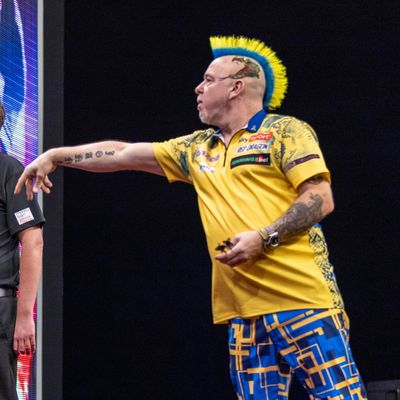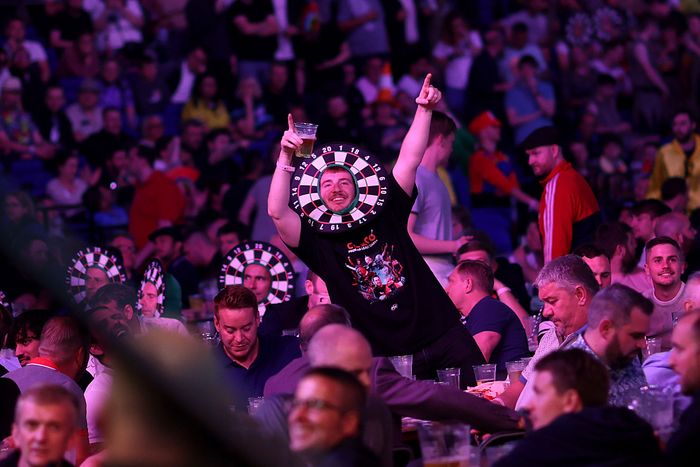
Back in February, the Welsh professional-darts player Gerwyn Price did something amazing. On a single night of Premier League competition in Belfast, he landed two separate nine-dart finishes, which is to say he twice reached the 501 points required to win a leg of a match with the minimum number of throws. One of these in a major event is an impressive achievement; two of them in a night is historic.
But the scene around him might have been more incredible than the accomplishment itself — at least for those unfamiliar with modern European darts culture. As Price’s darts hit the board, an excited announcer informed the sold-out, 7,500-strong crowd of the score as if he were introducing the ’96 Bulls. Those fans, many of whom were wearing Halloween-like costumes, went wild, jumping and screaming and throwing beverages in the air. And when Price landed three triple-20s in a row, the place erupted as fans held up “180” signs, similar to the “Perfect 10” signs you might see following an especially epic jam at the NBA’s slam-dunk contest.
“The crowd went absolutely ballistic,” Price recalls, describing spectators flinging their alcoholic beverages in the air. “These beers are not cheap,” he says. “You’re talking seven, eight pounds a pint, and they’re just chucking ’em everywhere like nothing really matters. For me, to look off that stage and see that sort of atmosphere, it’s spine-tingling.”
That a darts competition would inspire the kind of fervor more associated with rowdy soccer fandom is largely thanks to a U.K.-based group called the Professional Darts Corporation. Over the past three decades, the ambitious organization has taken a low-key barroom staple and jazzed it up, adding pyrotechnics, dancers, and dramatic entrance music, among other flourishes. It calls darts — or its version of darts — “sport’s biggest party.” That party finally hits New York for the first time Friday and Saturday, when the World Series of Darts tour comes to Madison Square Garden’s Hulu Theater.
Unlike the U.S., the U.K. has been televising darts competitions for decades. Back in the days of four or fewer channels, it was not uncommon for one of them to be showing darts or other niche sports such as snooker. For decades, the atmosphere at these events was soporific — little raucous screaming, a lot of polite clapping. But in 1992, a schism in the sport led many of the best players to form a new organization, which eventually became the PDC. The reasons for the split had little to do with darts’ boring TV aesthetic, but after the new organization signed a contract with Sky Sports to televise its events, the upstart network introduced boxing-style introductions and generally gave the broadcasts more “pizzazz,” according to PDC chief executive Matt Porter.
Still, the evolution into a raucous sports spectacle was gradual. The Sky Sports money funded bigger prizes and more events, which led to bigger, increasingly lively crowds.
“As the events grew and were seen on TV, more casual fans — rather than people who were living and breathing darts — started to go to the events, and it just evolved from there,” says Porter.
As organic interest grew, the organization leaned into showmanship. A turning point, says Porter, came in 2005 with the advent of the Premier League, a touring event that plays in arenas in the U.K. and elsewhere in Europe and which regularly draws more than 10,000 fans per night. Now PDC competitor entrances look like this:
Not everything has been engineered from the top down. Porter says he isn’t sure how the tradition of fans wearing costumes — Batman, Waldo, Ali G, or anything else that might fall under the umbrella of British “fancy dress” — began, but it wasn’t his organization’s doing. Such fan-fueled traditions only add to the party vibe PDC was going for.
“We’re very conscious of two things,” says Porter. “One is that we deliver the best dart players in the world, producing world-class sport. And two is that we deliver the best atmosphere in sport, and we need to make sure that we satisfy our fans for both.”
Naturally, the PDC encourages its players to show off their personalities, a time-tested way to maintain audience interest. Price (nickname: “the Iceman”) is a former rugby player. Peter “Snakebite” Wright, the reigning world champ, is known for his colorful mohawk and loud outfits. Fallon Sherrock — who, like Price and Wright, will be competing in New York — is the first woman to reach the third round of the world championships and still has a fondness for hustling marks in bars when she can get away with it.
The organization also sells something few other sports can or would: the dream that you, the fan in the stands, could compete with the pros. Most sports are full of superhuman athletes performing impossibly hard physical feats most of us couldn’t imagine learning with a lifetime of practice. It’s insane to think you could smack a homer off Shohei Ohtani or win a point off Serena Williams. But part of pro darts’ appeal, according to everyone from its chief executive to its top players, is that anyone really could prove to have a knack for it, however unlikely that may actually be. And with such a low barrier to entry — you can literally just walk into a bar and play — anyone can try.
It helps that Wright, the reigning world champion, got his start this way.
“In 2007, I was watching the darts on TV and said to my partner at the time, Jo — who’s my wife now and my manager and my hairdresser — ‘I can beat him. I can beat him.’ I’m working in a garage, and they’re earning better money. And Jo said to me, ‘Why don’t you give it a go?’” He did, and it paid off; he’s since earned more than £3 million in prize money.
The PDC’s World Series of Darts tour aims to gain followers in less developed markets, the U.S. included. (It’s already traveled to Las Vegas three times between 2017 and 2019.) And while American events aren’t the most lucrative on the schedule, their potential upside is enormous.
Darts wouldn’t be the first sport to make inroads here after decades of relative indifference. F1 racing is having a moment, for instance, thanks in no small part to Netflix’s reality show Drive to Survive. But while Porter says there are lessons the PDC can learn from the show’s success and how it brings people closer to the sport and its competitors, the organization knows it has a way to go. “Formula One is a truly global sport with truly global resources, and we are still on our journey to that stage,” he says.
So while the next great darts player isn’t likely to be in the stands at the Garden’s theater this weekend, it’s a rare chance for New Yorkers to get a taste of the madness, even if they’re familiar with the PDC only through the occasional online video.
Says Price, “Unless you’re in the center of the atmosphere, I don’t think you’ll ever understand how fantastic darts is as a sport.”






























